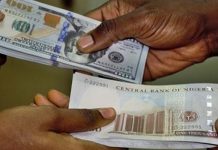The sterling jumped on Friday after a newspaper report cited cabinet ministers as saying Britain could seek to delay its scheduled departure date from the European Union.
A denial by Prime Minister Theresa May’s spokeswoman knocked sterling off highs but it remained up on the day, with analysts citing a growing sense among some investors that Britain will not be leaving the EU on March 29.
Two of the biggest donors to the Brexit campaign told Reuters they now believe the project they championed will eventually be abandoned by the government, underlining the uncertainty about what will happen after March 29, Britain’s scheduled departure date from the European Union.
Data published on Friday showed Britain’s economy cooled in the three months to November, but the focus remained on May’s efforts to get her Brexit deal through parliament.
A series of setbacks suffered by May in parliament ahead of the vote on her Brexit deal next week had pushed sterling to a one-week low against the euro before London’s Evening Standard reported that Britain could extend Article 50.
On Friday it rose as much as 0.6 percent to $1.2851, its highest since late November. Against the euro it rose 0.5 percent to 89.80 pence.
Not all analysts are agreed that a delay to Britain’s Brexit date will benefit the UK.
“Politicians love to kick the can down the road but there is a cost associated with that. Consumer confidence has weakened, business confidence has weakened so that time comes with a cost,” said Mike Bell, global market strategist at JP Morgan Asset Management.
Parliament is due to vote on May’s withdrawal deal, agreed with Brussels, on Jan. 15, but the prime minister looks set to lose the vote.
FALLING VOLS
The run-up to the parliament vote is likely to dominate trading of sterling but the consequences of its outcome for the British currency are far from clear.
“Some of the Brexit scenarios are very bearish for GBP. We’d prefer caution at this stage rather than opting for some lottery ticket on a sharp GBP rally,” said Petr Krpata an FX strategist at ING in London.
British lawmakers have demanded a quick plan B if May loses the vote and that could reduce the chances Britain will leave the EU without a deal on their future relationship.
Despite the uncertainty, the risk that sterling will fall against the dollar is deemed the lowest in more than four months, according to one-month risk reversals, a gauge of market positioning.
Expectations for sterling price swings have also diminished in the last few sessions, with investors now expecting less implied volatility over a one-month period.
“A no-deal Brexit has become less likely. But anyone who tries to make a prediction of what the Brexit outcome will be is only deluding themselves,” said Sarah Hewin, chief Europe economist at Standard Chartered.
“Both extremes look live – the chance of a no-Brexit and the chance of a no-deal Brexit.”













